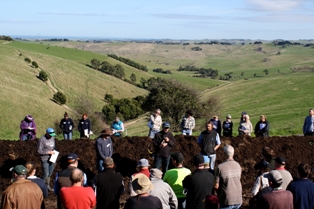This compost pile was the star attraction for more than 100 farmers and agricultural industry members, who flocked to Craig Mathews’ Bass Coast dairy farm to find out more about on-farm composting.
Composting spoiled hay might not be up there with the London Olympics in terms of big events but over the past year people have been turning out in droves to field days at places where you don’t usually find a crowd. Held at Bridgewater, Pyramid Hill, Terang, Macarthur (near Hamilton) and Glen Alvie (near Wonthaggi), the field days attracted more than 400 people from across the state, with a handful of people making the trip from north and west of the border. Department of Primary Industries (DPI) Productive Soils Specialist Declan McDonald said the field days were popular because at the time tens of thousands of hay bales had been spoiled in the 2010-11 Victorian floods. |  |
“We wanted to help producers recoup some of their investment so we looked at using hay bales to fill old gullies, spreading hay over the surface of paddocks and allowing pasture to grow through, and composting the spoiled hay but the demand for the field days still exceeded my expectations,” Mr McDonald said.
“Of these options, composting had the greatest potential to return benefits to the farm so this became the focus of the field days and a step-by-step guide which we have just released.”
DPI Senior Research Scientist Kevin Wilkinson said he was aware of about 50 dairy farmers in South West Victoria who were on-farm composting and using the compost on their pastures to complement their traditional nutrient management program.
“Anecdotal evidence suggests these farmers are managing to maintain productivity by using less inorganic fertiliser but it’s important for us to scientifically validate this,” he said. | "composting had the greatest potential to return benefits to the farm" |
“While the field days were a great way to get science out into a paddock and show people the opportunities and limitations of using on-farm composting, people have been asking what’s next.
“Having just received a grant through the federal government’s Action on the Ground program we are joining forces with Monash University to trial and demonstrate on-farm composting practices in South West Victoria using dairy effluent and manure.
“In time, we hope our work will create a reliable source of evidence based information that dairy farmers can use to make informed decisions about how to increase carbon in their soils and reduce fertiliser inputs on their farms.”



